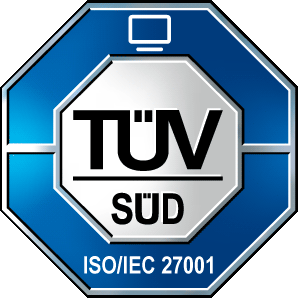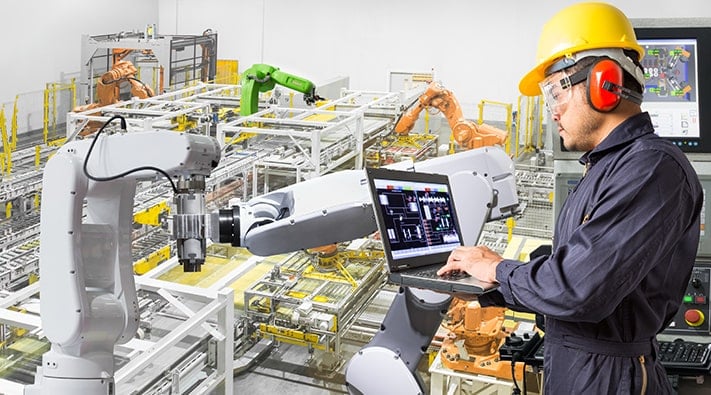DriveLock received Common Criteria EAL 3+ certification
Munich 07/04/2021 - DriveLock's Device Control and Application Control solutions received Common Criteria certification from the independent Swedish...

In a world in which the safety, quality and reliability of products and services are becoming increasingly important, TÜV certification plays a crucial role. TÜV stands for Technischer Überwachungsverein and comprises a group of independent testing, inspection and certification organisations that specialise in ensuring standards in almost all key industries in Europe.
| TABLE OF CONTENT |
Whether in the energy sector, infrastructure, medicine, manufacturing, technology or consumer goods - TÜV certification stands for the highest safety and quality standards.
This article sheds light on the importance of TÜV certification, the process behind it and the positive effects on companies and consumers alike.
TÜV (Technischer Überwachungsverein) is an organisation that mainly operates in Germany and carries out technical inspections. Among other things, TÜV monitors and tests the safety of technical systems, vehicles and products to ensure that they comply with legal requirements and do not pose a risk to public safety.
The TÜV organisations test systems and products in almost every major industry in Europe, including energy, infrastructure, medicine, manufacturing, technology and consumer goods. The most important members of the TÜV Group include TÜV SÜD, TÜV Rheinland, TÜV Nord, TÜV Saarland, TÜV Hessen and TÜV Thüringen.
TÜV certification is a process in which a product, system or service is tested and certified by a technical inspection organisation (TÜV) against certain standards and norms. TÜV is an independent organisation that specialises in the testing, inspection and certification of products and systems. Here are the basic steps and aspects of TÜV certification:
The process begins with the application by the company or manufacturer seeking certification for its product or system. The company submits the required documents and information.
TÜV carries out a preliminary review of the documents submitted to ensure that all the necessary information is available and that the product or system is fundamentally suitable for certification.
Depending on the type of product or system, a detailed test and inspection is carried out. This may include laboratory tests, on-site inspections, safety assessments and other specialised tests. The aim is to verify conformity with the relevant standards and norms.
Once the tests and inspections have been completed, TÜV evaluates the results and prepares a detailed report. This report documents the findings and indicates whether the product or system fulfils the required standards.
If the product or system fulfils the requirements, a certificate is issued. This certificate certifies that the product or system fulfils the tested standards. It can take various forms, e.g. a CE mark, a GS mark (tested safety) or other specific certificates.
Certification is often associated with ongoing surveillance. This means that the TÜV carries out regular inspections to ensure that the product or system continues to meet the standards. In some cases, periodic recertification is also required.
Overall, TÜV certification is a comprehensive and rigorous process that helps to ensure the safety, quality and conformity of products and systems.
The TUV certification process continues to evolve over time to adapt to new standards, regulations and technological advancements. While specific details about changes from 2017 to 2022 may vary depending on the type of certification and industry, here are some general differences that can be observed in TUV certifications between these years:
1. Updated standards and regulations: The TÜV certifications in 2017 were in accordance with the standards and regulations in force at that time, which may now be outdated or revised.
2. Technological progress: The certification processes in 2017 were based on the technical capabilities available at the time, which may have included manual testing and less advanced testing equipment.
3. Focus on sustainability and environmental impact: Even though sustainability played a role in 2017, the focus may not have been as pronounced as it is today.
4. Cybersecurity and data protection: Cybersecurity and data protection were important, but may not have been integrated into all certification processes.
5. Health and safety improvements: Health and safety standards were maintained in accordance with the knowledge and practices available at the time.
6. Greater transparency and traceability: Certification procedures may have been less transparent and traceability of certifications may not have been as detailed.
7. Integration of digital tools and platforms: The use of digital tools and platforms for certification management may have been limited.
1. Updated standards and regulations: In 2022, TÜV certifications will take into account the latest international and local standards to ensure compliance with the latest legal requirements. This includes updates to ISO standards, safety protocols and environmental regulations.
2.Technological advances: By 2022, TÜV certifications are likely to use more advanced technologies, including automated testing systems, AI-driven analyses and more sophisticated monitoring tools, leading to more accurate and efficient certification processes.
3. Focus on sustainability and environmental impact: The 2022 TÜV certifications place a stronger emphasis on sustainability, reflecting the increasing global focus on environmental impact and sustainability. This includes stricter environmental standards and more comprehensive assessments of the environmental footprint of a product or system.
4. Cybersecurity and data protection: In light of increasing cyber threats, TÜV certifications in 2022 are likely to place a stronger focus on cybersecurity measures and data protection to ensure that products and systems are not only physically secure, but also protected against digital threats.
5. Improvements in health and safety: In 2022, health and safety are likely to take centre stage as a result of global health crises and new research findings. This will include stricter testing and certification procedures to ensure the well-being of users.
6. Greater transparency and traceability: By 2022, TÜV certifications are likely to have greater transparency and traceability, where digital records and blockchain technology could be used to provide an immutable record of compliance and certification history.
7. Integration of digital tools and platforms: In 2022, the integration of digital tools and online platforms is likely to increase, allowing for more streamlined application processes, real-time tracking of certification status and easier access to certification documents and reports.
TÜV certification can significantly improve a company's reputation and credibility in the industry. This certification is a seal of quality and safety that proves compliance with strict standards and strengthens customer confidence.
TÜV certification helps companies to ensure that their products or services comply with the relevant national and international standards and legal regulations. This is particularly important in order to minimise legal risks and avoid penalties.
A TÜV certificate signals to customers, business partners and other stakeholders that a company complies with high safety and quality standards. This can strengthen trust in the brand and improve the company's image.
In many industries and markets, especially in the European Union, certification is often a prerequisite for being allowed to sell products at all. TÜV certification can therefore facilitate and expand market access.
The certification process often involves a comprehensive review and analysis of a company's internal processes. This can lead to inefficient or faulty processes being identified and improved, resulting in long-term cost savings and greater efficiency.
By adhering to strict safety and quality standards, companies can significantly reduce the risk of product defects, recalls and liability claims. This contributes to the stability and reliability of business processes.
Many TÜV certifications also include environmental and sustainability standards. By complying with these standards, companies can improve their environmental performance and demonstrate their commitment to sustainable practices.
A certified company also shows its employees that it takes high standards and quality seriously. This can increase employee satisfaction and motivation, as they work in a company that emphasises safety and quality.
It not only ensures that products and services are safe and of high quality, but also strengthens customer confidence and improves competitiveness on the market.
TÜV certification plays a crucial role in the modern business world by ensuring that products and services fulfil high safety and quality standards. TÜV certification offers numerous advantages for companies: it helps to comply with legal regulations, strengthens trust and image, facilitates market access and creates a competitive advantage.
The certification process also helps to optimise internal processes and minimise risks. Overall, TÜV certification is a valuable investment that improves both the market position and the efficiency of a company in the long term.

Munich 07/04/2021 - DriveLock's Device Control and Application Control solutions received Common Criteria certification from the independent Swedish...

1 min read
Munich, Germany – DriveLock's Device Control and Application Control solutions received Common Criteria certification from the independent Swedish...

U.S. companies seeking contracts from the U.S. Department of Defense (DoD) and other federal agencies are required to demonstrate strict IT security...